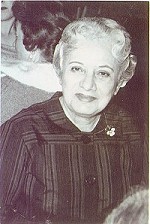
Rosa Gerhardt was the fourth of nine children born to Marcus and Esther Gerhardt. In 1914, her merchant father, a Hungarian emigrant, moved his family from Camden, Alabama to Mobile, Alabama. Rosa did well in school, exhibiting a keen acumen early. After graduating from Mobile High School at the age of sixteen, she taught public school in Dauphin Island, in the still existing "little red school house."
The advent of World War I presented Rosa with an opportunity to work in Washington D.C. After the war, she returned to Mobile and started working as a legal secretary for prominent Mobile lawyer, Gregory L. Smith, who encouraged Rosa to go to law school. When Smith died nine years later, Rosa finally followed his advice and enrolled at Cumberland School of Law in Lebanon, Tennessee.
Rosa graduated from law school in June of 1930 with "highest honor for the year." After passing the Alabama Bar Examination, she began practicing law in Mobile. She was the second woman lawyer to practice in that city; another woman having started her practice just the previous year. Rosa's independent nature and confidence in her abilities helped her to overcome any obstacles presented by the male-dominated profession she had chosen to join. She joined the Mobile Business and Professional Women's Club and served as president of that organization in 1941.
In 1945, Rosa became a federal court reporter on the side. That job gradually grew into a full-time position at the expense of her law practice. As the "official" reporter for the federal court she sat through countless hours of trial, adeptly taking down courtroom testimony word-for-word in shorthand. Soon, young lawyers and even judges sought Rosa for advice. Some of Mobile's most prominent lawyers fondly recall their associations with "Miss Rosa" early in their careers. "She was a good teacher, and I learned much about the practice of law from her," says former Mobile Bar President Vivian G. Johnston, Jr.
Not only did Rosa manage to hold her own in the male-dominated legal profession, but she earned the respect and admiration of her male peers. In 1947, she was elected President of the Mobile Bar Association. She served in that capacity the following year - the first woman lawyer in Alabama to earn such an honor in a local or state bar association.
Rosa retired from her position as federal court reporter in 1965. Having worked in that position for some twenty years, she had become a well-known fixture at the federal building. Upon her retirement, she was honored for her contributions to local jurisprudence by both the presiding federal judge and the Mobile Bar Association. She died in January of 1975 after a brief illness. Her legacy as one of Alabama's pioneers in the legal profession lives on, especially in those who were fortunate enough to benefit personally from her expertise and guidance.
![]() Other Inductees
Other Inductees
![]() Alabama Women's Hall of Fame
Alabama Women's Hall of Fame